office
2323 Park Avenue
Chico, CA 95928
Support
Monday – Friday
10 a.m. - 6 p.m.
© 2023 Springboard Biodiesel | All Rights Reserved | Website Designed by Luminous
benefits, case studies, testimonials

Save Money, Reduce CO2, and Enhance Curricula
Discover how schools across the world are using Springboard Biodiesel processors to generate their own clean biofuel.

Save Money on Fuel Costs, Reduce Carbon Emissions, Educate
Most school systems are in the business of feeding not only the minds, but the stomachs of students (and staff). Cooking oils that are reclaimed from the kitchens and restaurants of any institution can be converted into ASTM-grade biodiesel for approximately $1 per gallon in BioPro™ biodiesel processors. Operated at only 50% capacity, Springboard's BioPro equipment pays for itself in 5 to 11 months depending on which model and what volume of cooking oil and institution can gather.
According to a study by the California Air Resources Board, biodiesel made from used cooking oil emits 88% less CO2 and 50% less soot than regular diesel. In September of 2015, CARB confirmed that biodiesel is the lowest carbon emitter of all the liquid fuels.
BioPro systems are currently in use at 101 different colleges, universities, and H.S. systems. Most of these institutions incorporate the equipment into their curricula. Classes in ecology, environmental studies, chemistry, engineering, and agriculture teach students the process of making a renewable alternative fuel, not just domestically but on campus, that works in any diesel engine without the need to convert that engine.
The benefits for schools include:
Furthermore,

Dr. Ernst Cebert (leftmost) and students from Alabama A&M's Department of Biological and Environmental Services have been working closely with the Toyota manufacturing plant of Huntsville, AL to make fuel from Toyota's cafeterias into ASTM grade biodiesel which is then used in plant vehicles. Toyota's North America 2013 Environmental report states, "The Huntsville plant delivers between 55 and 100 gallons per month of used cooking oil to Alabama A&M University, where the waste oil is converted to biodiesel using a Springboard Biodiesel BioPro 190 unit. The unit is designed to produce ASTM-quality fuel, and is about the size of a stand-up arcade game." Watch this video on Toyota's closed loop biodiesel program.
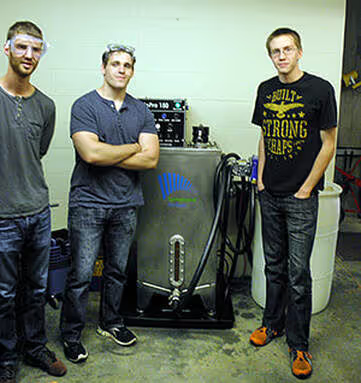
Students in professor Susan Newton's Bio-fuels and Biomass class at John Brown University in Sloam Springs, AR stand with their trusty BioPro 150. The class description reads: "Three hours introduction to power production from different biomass resources. Topics include: bio-energy sources (agricultural crops and organic wastes), combustion of solid biomass, production of gaseous and liquid fuels from biomass, environmental benefits and economic impacts of biomass conversion. A link to a more in-depth description of their innovative program can be found here. A link to the JBU Renewable Energy Major is here. Susan writes, "It is now an Engineering concentration instead of a standalone major."

.avif)
Rochester Institute of Technology professor David Fister loads up a BioPro™ 190 during a workshop presentation in October, 2012. David reports that the on-campus workshop was "so well attended that we had people sitting in the aisles."
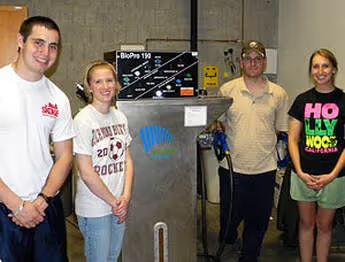
Illinois State University is one of 72 educational institutions that has discovered that it can collect waste cooking oils from its kitchens and cafeterias and convert that "yellow gold" into ASTM-grade biodiesel in a BioPro. Students from the Environmental Health Department stand with the campus BioPro 190 in an agricultural lab room on campus. ISU made a little less than 1,000 gallons of biodiesel in 2010 (their first year) and they hope to make more than 3,000 in 2011. So far, they use the fuel in a campus truck and several tractors.
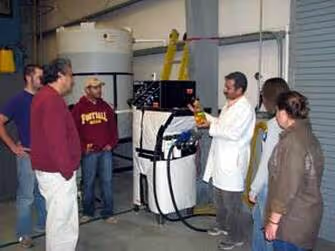
Louisiana State University operates a BioPro 190 in its Agricultural Research facility. Training in biodiesel production is offered to students and teachers alike and has also been given to farmers and interested members of the community; LSU produces biodiesel for research purposes. They also actively research alternative feedstock sources.
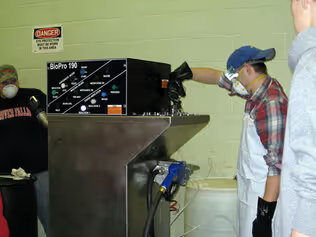
The University of Wisconsin is one of 101 universities and colleges that currently owns and operates a BioPro as part of the regular curriculum. Students in the Agricultural Engineering Technology Department in River Falls operate the machine at a campus biodiesel processing facility.
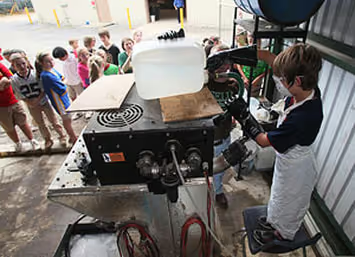
Operating a BioPro is so easy, even a 6th grader can do it. Sixth graders in Hammond, LA. participate in a demonstration of a BioPro on the campus of Southeast Louisiana State University. The Biodiesel Program at Southeastern Louisiana State University
The Alabama Institute of the Deaf and Blind operates a BioPro 380EX and a SpringPro T76..."We wanted to make sure the students were safe".